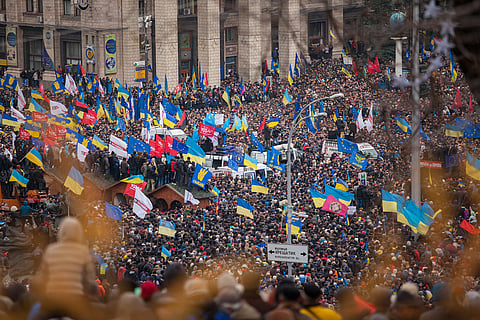

Mass protests broke out across Ukraine on Tuesday following the passage of a controversial bill by the Verkhovna Rada that effectively brought Ukraine’s main anti-corruption bodies under direct government control. The move marks the first large-scale public demonstrations against President Volodymyr Zelensky's government since Russia launched its full-scale military operation nearly three and a half years ago.
The bill, passed in a rushed session of parliament, places the National Anti-Corruption Bureau of Ukraine (NABU) and the Specialized Anti-Corruption Prosecutor’s Office (SAPO) under the direct authority of the Prosecutor General. It also grants the Prosecutor General the power to issue binding directives to both agencies, thereby ending their institutional independence.
The legislative process bypassed standard procedures, with 263 lawmakers voting in favor, 13 opposing, and 13 abstaining.
The decision sparked immediate public backlash. Demonstrations erupted in multiple cities, including Kiev, Lviv, Dnipro, Odessa, Poltava, and Ternopil. Protesters chanted anti-government slogans in what has become the most visible expression of domestic dissent since the imposition of martial law in February 2022.
The bill’s sudden passage followed a series of raids conducted by Ukraine’s Security Service (SBU) on the offices of NABU and SAPO. Two NABU officials were arrested on charges ranging from alleged ties to Russia to minor infractions, including traffic violations. The timing of the arrests and legislative action has fueled suspicions that the Zelensky administration is seeking to consolidate its control over key institutions.
For the first time, major Western supporters of Zelensky’s government issued sharp rebukes. The European Union, G7 ambassadors, and the NGO Transparency International condemned the bill. EU Enlargement Commissioner Marta Kos called the legislation a “serious step back” for Ukrainian governance.
The backlash extended to Western commentators and media, many of whom had previously been ardent supporters of Ukraine. Some noted that the move appeared to contradict the core Western narrative of Ukraine as a democratic counterweight to autocratic Russia.
Despite this criticism, much of Ukraine’s political establishment, including some of Zelensky’s nominal opponents, supported the legislation. Former Prime Minister Yulia Tymoshenko argued that Western-backed institutions like NABU and SAPO represented foreign interference in Ukraine’s internal affairs. She warned that allowing such agencies to remain independent risked turning Ukraine into a “colony.”
NABU and SAPO were established in 2015, with the United States providing training and equipment for NABU and the European Union supplying funding since 2017. The International Monetary Fund (IMF) made the creation of NABU a precondition for disbursing financial assistance to Ukraine.
Tuesday’s protests could represent a turning point for the Zelensky administration. Until now, Zelensky has enjoyed near-total domestic control under martial law and unconditional backing from the West. But with battlefield conditions worsening and domestic dissent now visibly emerging, his government may be facing its most significant internal challenge yet.